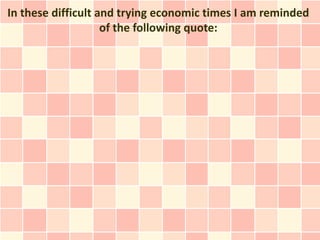
The Money Saving Numbers I Try to Live My Life By
- 1. In these difficult and trying economic times I am reminded of the following quote:
- 2. "Annual income twenty pounds, annual expenditure nineteen nineteen and six, result happiness. Annual income twenty pounds, annual expenditure twenty pounds ought and six, result misery."
- 3. - Charles Dickens, David Copperfield, Ch. 12
- 4. The quote reminds us that if we spend more than we earn the only result is uncontrolled debt and, inevitably, misery. Living within our means is a lesson that has been hard to remember as we have grown used to the unrelenting supply of cheap credit. And, despite the financial crisis of 2009, we still seem to be, as a society, hell-bent on spending more than we have.
- 5. This is a good place to admit that I am no angel when it comes to credit as I have, in the past spent more than I earned, creating a level of debt that was unsustainable. Throw in an unplanned redundancy and I certainly experienced some of the misery that Dickens wrote about.
- 6. So how can you regain control of your money and escape the misery of debt?
- 7. I decided to handle my finances differently by using a very simple formula which gave me two significant numbers to live by which I call the 80:20 rule.
- 8. First I took my last six months of bank statements and reviewed everything that I spent money on. I would recommend six months worth of bank statements as this gives a more representative picture of what you are spending your money on. I divided where I was spending money into three general groups which I called fixed expenditure, variable expenditure and disposable income.
- 9. My fixed expenditure included all my major household bills, so mortgage, utilities and insurance policies.
- 10. Variable expenditure was stuff that I spent money on every month but that changed from month to month. This included things such as food, fuel for the car and entertainment. As you can see these varied because if I did not drive the car or I ate out less, then the overall money that I spent would go down. I, importantly, included my credit card bill in this group as if I spent more on my credit card then my credit card bill would go up and vice versa.
- 11. The disposable income was the money that I had left from what I earned after I had taken out the fixed and variable expenditure.
- 12. I then converted everything into a percentage. So for example if my earnings for a month were £1000 and all my bills (fixed expenditure) was £600, my variable expenditure was £300 and the money left was £100 that would be 60% fixed, 30% variable and 10% disposable.
- 13. Having broken my finances down into three simple numbers it was then an easy case of setting boundaries to live by which I called the 80:20 rule. That is my fixed and variable expenditure should not exceed 80% of my income giving me 20% of my income to use as I wanted. I also decided that of that 20% I would save half, that is to say 10% of my total income would go into a savings account. This is now an unbreakable rule that I live by.
- 14. Believe me this has been a hard set of numbers to stick to but in the end I have seen the benefit of doing this. So give it a go and try to live by the 80:20 rule, you will see the benefit.
